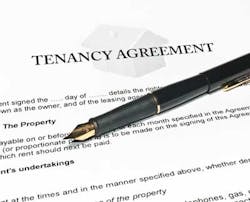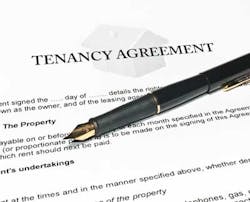Get the Answers Before Signing a Dental Office Lease
by Barry F. Levin, Esq. and Philip M. Bogart, Esq.
Unless a dentist owns his or her dental office, the lease agreement is probably one of the most important business agreements that he or she will ever enter into with another party. Nevertheless, many dentists (and many other professionals as well) do not even read their leases agreements until there is a problem. Even if a dentist reviews the lease, sometimes the scope of review is limited to the duration of the lease and the monthly rent payment.
The biggest — and most common — mistake is assuming the initial form lease presented by the landlord is nonnegotiable. Worse, often dentists rely upon assurances from the real estate brokers that the form is “standard in the industry” or just “boilerplate.” There is no such thing as a "standard lease." At other times, a dentist becomes a party to a lease as a result of a practice acquisition. As a result, the buying dentist assumes that he or she is bound to accept the existing terms and conditions of the lease.
While not comprehensive, the following items should be considered when reviewing the terms of a dental practice lease:
1. Negotiate. Never simply “sign on the dotted line.” Leases usually are negotiable. Even if the landlord will not modify the economic terms, he or she may be willing to soften or remove other detrimental provisions.
2.Know who your friends are. Most brokers represent landlords. While the broker may seem to be genuine, he has one goal in mind: get the lease signed and get paid a commission. Proceed with caution.
3. Rent. Is the rent per square foot standard in the area? How often does the rent increase per year? While a 3% or 4% annual increase may be acceptable, a 5% increase is extreme. Remember, rent increases are compounded, so even 3% annually — which seems low — is a 16% increase in rent at the end of five years.
4. Triple net. Many leases are triple net — meaning, the tenant will pay for taxes, insurance and maintenance expenses on not only the tenant’s space, but also on the tenant’s pro rata portion of the common areas, too (parking lot, lobby, elevator, etc.). Understand the actual cost of the lease — the monthly payment amount may be significantly higher than originally anticipated.
5. Sharing real estate taxes; CAM fees. There are different ways a landlord may require a tenant to pay for the real estate taxes. In a true triple net lease, a landlord may require the tenant to pay for its entire pro rata share of the taxes. Or, the landlord may agree to pay a specific “base” amount of the taxes, and the tenant would then pay for its pro rata share of any increase over that base amount. If the office is in a condominium, the tenant will also pay its pro rata share of CAM fees (common area maintenance fees).
6. Grace period. Accidents happen. Checks do get lost in the mail. The landlord should not have the ability to assess a late fee (or terminate the lease) unless the rent payment is not paid within a grace period, which may be between five (5) and twenty (20) days. Be sure to ask for a grace period and an opportunity to cure other monetary and nonmonetary defaults.
7. Term; options. Ensure that the term of the lease is long enough. The three most important rules of real estate, of course, apply to a dental office (i.e., location, location, location). Most dentists acknowledge that a significant portion of their practice’s goodwill is dependent upon its location. A move could jeopardize that goodwill value. Additionally, a practice without an adequate lease term will not be attractive to potential buyers. Lenders typically also require the lease to have a minimum duration. Then, again, the term shouldn’t be too long. An initial seven (7) to 10-year term, with a few options to renew, should suffice.
8. Option to buy. Landlords are willing, at times, to grant their tenants the option to purchase or a right of first refusal, if the property is to be sold. The tenant may even have the ability to agree upon a predetermined price (or, an agreed-upon mechanism for establishing a price).
9. Assignable; Release upon assignment. If the dentist decides to sell his or her practice, a significant part of the value may depend upon the physical plant and the location (which may be included in the value of the goodwill of the practice). Sometimes, landlords will agree to an assignment clause that permits the buyer of the practice to become an assignee without the landlord’s prior consent. In addition, upon the landlord granting an assignment, it can be extremely valuable to the tenant for the landlord to agree in advance to release the assigning tenant (and any personal guarantee) upon the completion of a sale.
10. Other competitors in complex? Depending upon the dentist’s bargaining power, the landlord may be willing to agree to a covenant to not rent any of its other space within the immediate vicinity to a competing practice.
11. Permitted use. Ensure that the local zoning laws permit the dental office in the premises.
12. Build-out. If the new tenant plans to build out or renovate the space, landlords sometimes will agree to a temporary rent abatement or an allowance for construction expenses.
13. Subleasing. Will the dentist be permitted to sublet? For example, it is not uncommon for a pediatric dentist to sublet a portion of the space to an orthodontist.
14. Duty to mitigate. In the event the tenant vacates the premises or is otherwise evicted, the landlord will usually have the right to require the tenant to pay for unpaid rent until the end of the lease term. While various states have laws requiring a landlord to mitigate the damages, the lease can require a landlord in such a situation to use its reasonable efforts to find a replacement tenant. That way, the tenant’s loss may be minimized.
15. Condominium issues. If the premises are part of a condominium, ensure that the dental office is a permitted use of the office. Other than CAM fees, does the lease contain any other hidden fees arising from the condo?
16. Personal guarantee. It is not uncommon — especially in today’s environment — for a landlord to require a personal guarantee from the dentist. Sometimes, the landlord may also demand a spousal guarantee. Depending upon the relevant leverage of each of the parties, it may be hard to convince the landlord to not require a personal guarantee. At times, though, the landlord may agree to a “burn-off period," where the guarantee would automatically terminate at a specific time in the future, as long as the tenant has made all rental payments.
Remember, leases are seldom nonnegotiable. But even if the landlord is inflexible and not willing to make any changes to the lease, it is still important for the new tenant to understand his or her obligations and rights (if any) under the lease. Like oral prophylaxis, working with a trusted legal advisor who has experience reviewing and negotiating leases can be a very smart investment. An ounce of prevention is worth a pound of cure!
Barry F. Levin is a partner and chair of Saul Ewing LLP’s business and finance department. Philip M. Bogart is a special counsel in the business and finance department in Saul Ewing LLP’s Baltimore office. Messrs. Levin and Bogart regularly represent dentists — and the business entities in which clinicians practice — in all aspects of the dental practice structure through and including the structuring, negotiation, documentation, and implementation of associateships or employee arrangements, partnership arrangements, acquisitions, and sales and mergers of mature practices.

